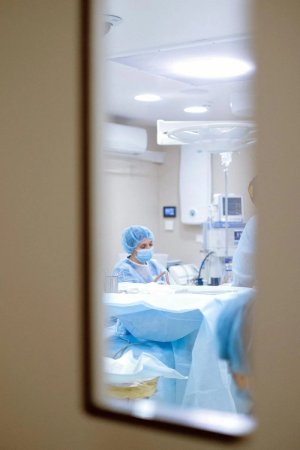The strange link between surgery and unexpected sexual fantasies
By
Veronica E.
- Replies 0
Disclaimer: The information provided in this article is for educational purposes only and is not intended as a substitute for professional medical advice, diagnosis, or treatment. Always consult your physician or other qualified healthcare providers with any questions you may have regarding a medical condition or before making any changes to your health regimen.
For many of us, surgery is something we face at least once in our lives—whether it’s for a joint replacement, cataract removal, or a routine outpatient procedure.
We place our trust in doctors, hospitals, and medications to keep us safe and comfortable during those times.
But some patients are waking up from anesthesia with vivid, sometimes unsettling dreams or memories—leaving them unsure of what actually happened.
While these incidents are rare, they’re real—and can be deeply confusing.
In this article, we explore what science says about this unusual phenomenon, why it occurs, and what patients and families can do to feel more informed and prepared.

Anesthesia is an essential part of modern surgery.
Powerful medications like propofol, ketamine, benzodiazepines (including midazolam and diazepam), and nitrous oxide are used to help patients relax, reduce pain, and drift off safely during medical procedures.
But in a small number of cases, patients report vivid sexual hallucinations or dreams while under anesthesia or during recovery.
These experiences can range from mildly embarrassing to deeply distressing—and in some cases, they may lead to lasting emotional confusion or anxiety.
Some individuals wake up feeling as though something inappropriate occurred during surgery.
Others recall intensely realistic fantasies or hallucinations that blur the line between dream and reality.
Experts say this phenomenon, while rarely discussed, is not unheard of.
Dr. Gary Wenk, a professor of psychology and neuroscience at Ohio State University, has been studying the impact of anesthesia on the brain.
He notes that while few patients report these side effects, they may be more common than we realize—particularly among those who feel too uncomfortable or embarrassed to speak up.
In one study, researchers found that nearly 40% of the sexual hallucinations reported by patients were linked to benzodiazepines, especially at higher doses.
Another study involving dental patients noted that a combination of medications—like fentanyl, diazepam, and methohexital—triggered sexual arousal or hallucinations in a significant number of participants.
Here’s a breakdown of what patients reported:
In some instances, these hallucinations were so vivid that patients believed they had been assaulted—despite no evidence of wrongdoing—highlighting the emotional toll these experiences can have.
The brain under anesthesia enters a state that’s not quite sleep and not fully awake.
Dr. Wenk likens it to dreaming—but says the hallucinations brought on by sedatives can feel unusually lifelike.
In some cases, patients’ subconscious fears, memories, or emotions may influence the content of these dreams or hallucinations.
Research suggests that certain factors may increase the likelihood of these experiences:
These side effects aren’t limited to anesthesia.
Some medications used for conditions like depression, ADHD, and Parkinson’s disease—especially those that enhance dopamine—have been linked to heightened sexual thoughts or hallucinations, particularly in men.
While some patients describe these experiences as odd but harmless, others are left feeling unsettled, embarrassed, or even traumatized.
One woman, after a vivid hallucination under ketamine, chose never to use that medication again.
Others have avoided medical care altogether out of fear that the experience might repeat itself.
These reactions are understandable—but it’s important to remember that these hallucinations are not signs of mental illness.
They’re an unusual but recognized side effect of certain medications.
1. Ask questions before your procedure
Speak openly with your doctor or anesthesiologist about the medications being used. If you have any concerns—especially based on past experiences—mention them in advance.
2. Request a chaperone
If it brings peace of mind, ask for a nurse, family member, or hospital staff to be present during your procedure or while recovering.
3. Report anything unusual
If you wake up with a vivid or upsetting memory, talk to your doctor. It may help clarify what happened and reduce unnecessary worry.
4. Know you’re not alone
Although rarely discussed, you’re not the only one who may have experienced something unusual during surgery. Speaking up can help others feel less alone and encourage better awareness among care providers.
This remains a debated issue.
Some experts worry that warning patients could unintentionally increase the likelihood of hallucinations.
Others argue that transparency helps patients feel safer and more prepared.
Ultimately, it’s a conversation worth having with your healthcare team.
Anesthesia has transformed medical care, allowing millions of people to undergo safe and pain-free procedures each year.
For the vast majority, there are no complications or unusual experiences.
But for those who do have a strange or unsettling memory afterward, it helps to know you’re not alone—and that help and understanding are available.
If you or a loved one has experienced something like this, speaking with a doctor, counselor, or support group can help bring clarity and peace of mind.
Read next: A new head of hair—but at what cost? The truth about transplants

Have you ever had a vivid or unexpected dream after a medical procedure? Did you feel comfortable discussing it with your doctor or loved ones? Share your thoughts in the comments below—your story might help someone else feel less alone!
For many of us, surgery is something we face at least once in our lives—whether it’s for a joint replacement, cataract removal, or a routine outpatient procedure.
We place our trust in doctors, hospitals, and medications to keep us safe and comfortable during those times.
But some patients are waking up from anesthesia with vivid, sometimes unsettling dreams or memories—leaving them unsure of what actually happened.
While these incidents are rare, they’re real—and can be deeply confusing.
In this article, we explore what science says about this unusual phenomenon, why it occurs, and what patients and families can do to feel more informed and prepared.

While surgery is often routine and safe, some patients report experiencing vivid or confusing dreams during recovery—raising new questions about rare side effects. Image Source: Pexels / Anna Shvets.
An unexpected side effect few people talk about
Anesthesia is an essential part of modern surgery.
Powerful medications like propofol, ketamine, benzodiazepines (including midazolam and diazepam), and nitrous oxide are used to help patients relax, reduce pain, and drift off safely during medical procedures.
But in a small number of cases, patients report vivid sexual hallucinations or dreams while under anesthesia or during recovery.
These experiences can range from mildly embarrassing to deeply distressing—and in some cases, they may lead to lasting emotional confusion or anxiety.
Some individuals wake up feeling as though something inappropriate occurred during surgery.
Others recall intensely realistic fantasies or hallucinations that blur the line between dream and reality.
Also read: Save your smile: Why you shouldn’t cheap out on dentists
What the research shows
Experts say this phenomenon, while rarely discussed, is not unheard of.
Dr. Gary Wenk, a professor of psychology and neuroscience at Ohio State University, has been studying the impact of anesthesia on the brain.
He notes that while few patients report these side effects, they may be more common than we realize—particularly among those who feel too uncomfortable or embarrassed to speak up.
In one study, researchers found that nearly 40% of the sexual hallucinations reported by patients were linked to benzodiazepines, especially at higher doses.
Another study involving dental patients noted that a combination of medications—like fentanyl, diazepam, and methohexital—triggered sexual arousal or hallucinations in a significant number of participants.
Here’s a breakdown of what patients reported:
- 60% experienced sexual hallucinations during the procedure
- 13% had similar dreams later at home
- 10% experienced hallucinations in the recovery room
In some instances, these hallucinations were so vivid that patients believed they had been assaulted—despite no evidence of wrongdoing—highlighting the emotional toll these experiences can have.
Also read: “I popped out the top of my head”: Woman shares chilling vision during life-saving surgery
Why do these hallucinations happen?
The brain under anesthesia enters a state that’s not quite sleep and not fully awake.
Dr. Wenk likens it to dreaming—but says the hallucinations brought on by sedatives can feel unusually lifelike.
In some cases, patients’ subconscious fears, memories, or emotions may influence the content of these dreams or hallucinations.
Research suggests that certain factors may increase the likelihood of these experiences:
- Women were more likely to have distressing or assault-related hallucinations, particularly if their anesthesiologist was male.
- Men were more likely to report pleasant fantasies, especially if their medical provider was female.
- The body part being operated on sometimes corresponded with the content of the hallucination, further confusing patients.
Other medications that may have similar effects
These side effects aren’t limited to anesthesia.
Some medications used for conditions like depression, ADHD, and Parkinson’s disease—especially those that enhance dopamine—have been linked to heightened sexual thoughts or hallucinations, particularly in men.
Also read: An eye for a…tooth? This man’s bizarre surgery seems like something out of the movies.
The emotional impact
While some patients describe these experiences as odd but harmless, others are left feeling unsettled, embarrassed, or even traumatized.
One woman, after a vivid hallucination under ketamine, chose never to use that medication again.
Others have avoided medical care altogether out of fear that the experience might repeat itself.
These reactions are understandable—but it’s important to remember that these hallucinations are not signs of mental illness.
They’re an unusual but recognized side effect of certain medications.
What patients and families can do
1. Ask questions before your procedure
Speak openly with your doctor or anesthesiologist about the medications being used. If you have any concerns—especially based on past experiences—mention them in advance.
2. Request a chaperone
If it brings peace of mind, ask for a nurse, family member, or hospital staff to be present during your procedure or while recovering.
3. Report anything unusual
If you wake up with a vivid or upsetting memory, talk to your doctor. It may help clarify what happened and reduce unnecessary worry.
4. Know you’re not alone
Although rarely discussed, you’re not the only one who may have experienced something unusual during surgery. Speaking up can help others feel less alone and encourage better awareness among care providers.
Also read: Breakthrough surgery revealed: How a pig’s liver may change the future of human transplants
Should doctors tell patients in advance?
This remains a debated issue.
Some experts worry that warning patients could unintentionally increase the likelihood of hallucinations.
Others argue that transparency helps patients feel safer and more prepared.
Ultimately, it’s a conversation worth having with your healthcare team.
Anesthesia has transformed medical care, allowing millions of people to undergo safe and pain-free procedures each year.
For the vast majority, there are no complications or unusual experiences.
But for those who do have a strange or unsettling memory afterward, it helps to know you’re not alone—and that help and understanding are available.
If you or a loved one has experienced something like this, speaking with a doctor, counselor, or support group can help bring clarity and peace of mind.
Read next: A new head of hair—but at what cost? The truth about transplants
Key Takeaways
- Certain sedatives and anesthetic drugs—like benzodiazepines, ketamine, and propofol—can sometimes cause vivid or sexual hallucinations in patients during or after surgery.
- These episodes are rare but often underreported, and may cause emotional distress or confusion—especially when the hallucinations feel real.
- Studies suggest women are more likely to experience distressing hallucinations, while men may report more pleasant ones. Dosage and the patient-provider dynamic may influence how these dreams are experienced.
- Patients are encouraged to speak with their doctor, ask about medications beforehand, and report any unusual experiences during recovery to help improve awareness and care.
Have you ever had a vivid or unexpected dream after a medical procedure? Did you feel comfortable discussing it with your doctor or loved ones? Share your thoughts in the comments below—your story might help someone else feel less alone!






